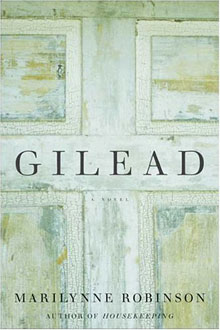Book Notes
 Marilynne Robinson, Gilead (New York: Farrar, Straus and Giroux, 2004), 247pp.
Marilynne Robinson, Gilead (New York: Farrar, Straus and Giroux, 2004), 247pp.
When I was in seminary my Hebrew professor Tom McComiskey once remarked that he had promised himself never to write a book until he was at least fifty years old. Gilead is probably a book you should not read until you are about fifty, or at least to an age when the accumulation of life experiences and your reflections about them have woven a rich tapestry whose beautiful texture could only result from many different strands—frailty and failure, memory and mystery, darkness and disappointment, regret and reconciliation, and weaving it all together sheer gratitude and joy at how remarkably beautiful the resulting garment of life still is. As the narrator-pastor John Ames writes to his son, "I always imagine divine mercy giving us back to ourselves and letting us laugh at what we became, laugh at the preposterous disguises of crouch and squint and limp and lour we all do put on. I enjoy the hope that when we meet [in heaven] I will not be estranged from you by all the oddnesses life has carved into me."
Pastor Ames of Gilead, Iowa, is 76, and "about to leave this world", and so this novel is actually his 240-page letter to his seven-year old son. We never learn the name of his precious son whom he so loves, and this is a delicious puzzle, for we know that the narrator-letter writer is a fourth generation "Pastor John Ames." His reflections are deeply personal and entirely inward, as he navigates the geography of his interior life. He admits, in fact, that as he looks over the pages he realizes he has been "worrying to myself" more than "speaking to my son." His interior musings are also intellectually supple, with references to Calvin, Feuerbach, Barth, the poet George Herbert, and Sartre. Parallel plots track his ambiguous feelings about "the beloved child of my oldest and dearest friend" who like him is also a pastor, and who named his son after Ames; the alienation between his grandfather who "preached his people into the war" in his abolitionist zeal to end slavery and his father who became a pacifist and joined the Quakers out of disgust for Christian support of war; and his relationship with his atheist brother Edward who studied theology in Germany.
Despite life's many incomprehensible experiences and anxieties, the near impossibility of untangling "what relationship this present reality bears to an ultimate reality," the repugnance he feels at being old and near death, Ames cannot repress his deep joy at the sacred gift called life: "Oh, I will miss this world!"
Robinson's first book called Housekeeping (1981) won the PEN/Hemingway Award for best first novel. This past spring Gilead won the Pulitzer for best fiction, and I noticed that the NY Times ranked it the #1 fiction book of 2004. I read very little fiction, but when I read Gilead I was reminded how myth and metaphor have such power to convey truth. Or as Chesterton remarked, "fairy tales are more than true, not because they tell us dragons exist, but because they tell us dragons can be beaten." For an excellent interview with Robinson, including reflections on her own Christian faith (she attends a Congregational church), see the March 18, 2005 exchange with her at http://www.pbs.org/wnet/religionandethics/week829/interview.html.


